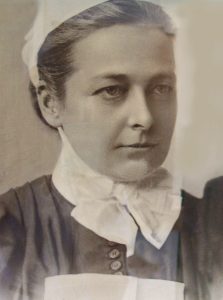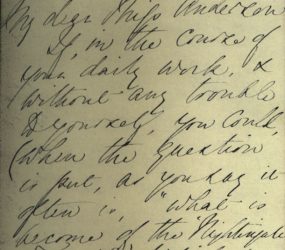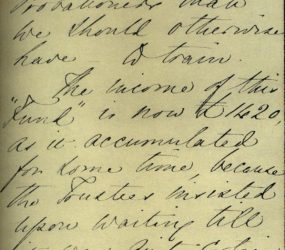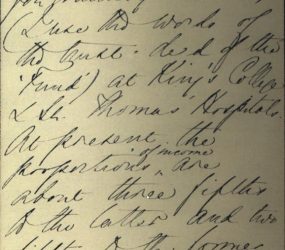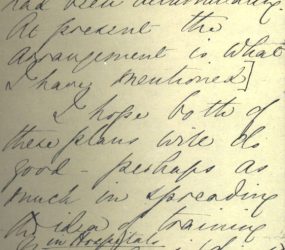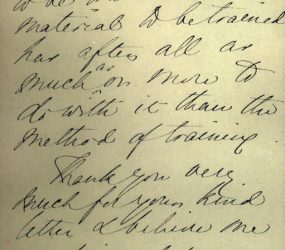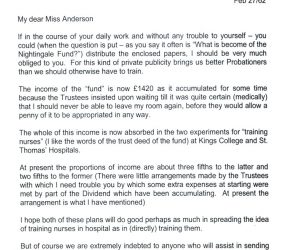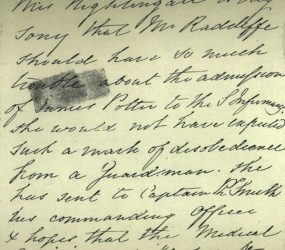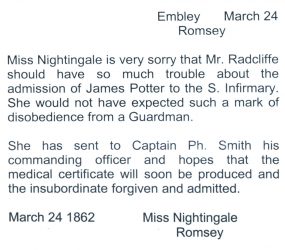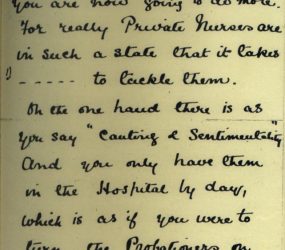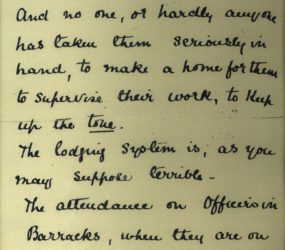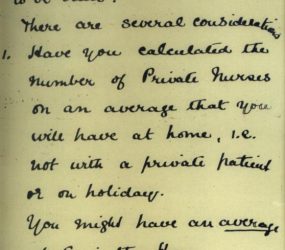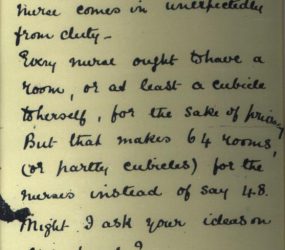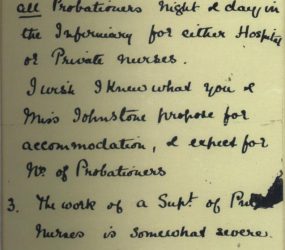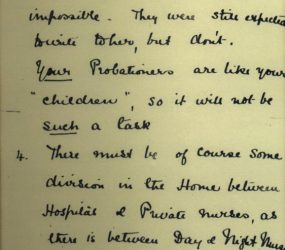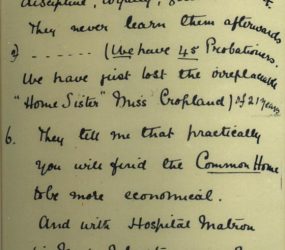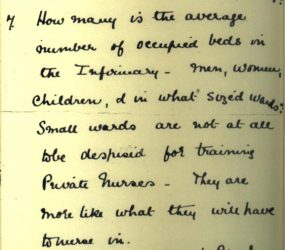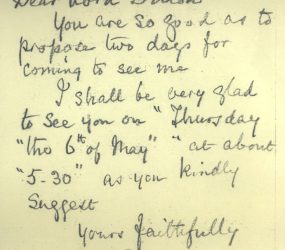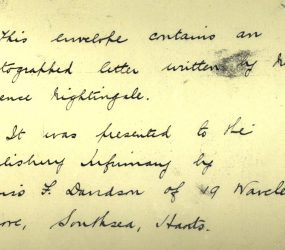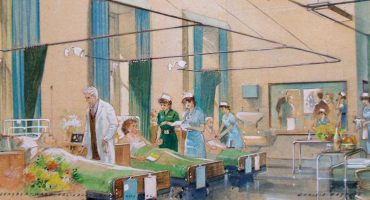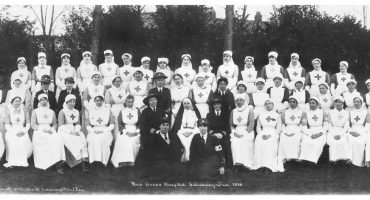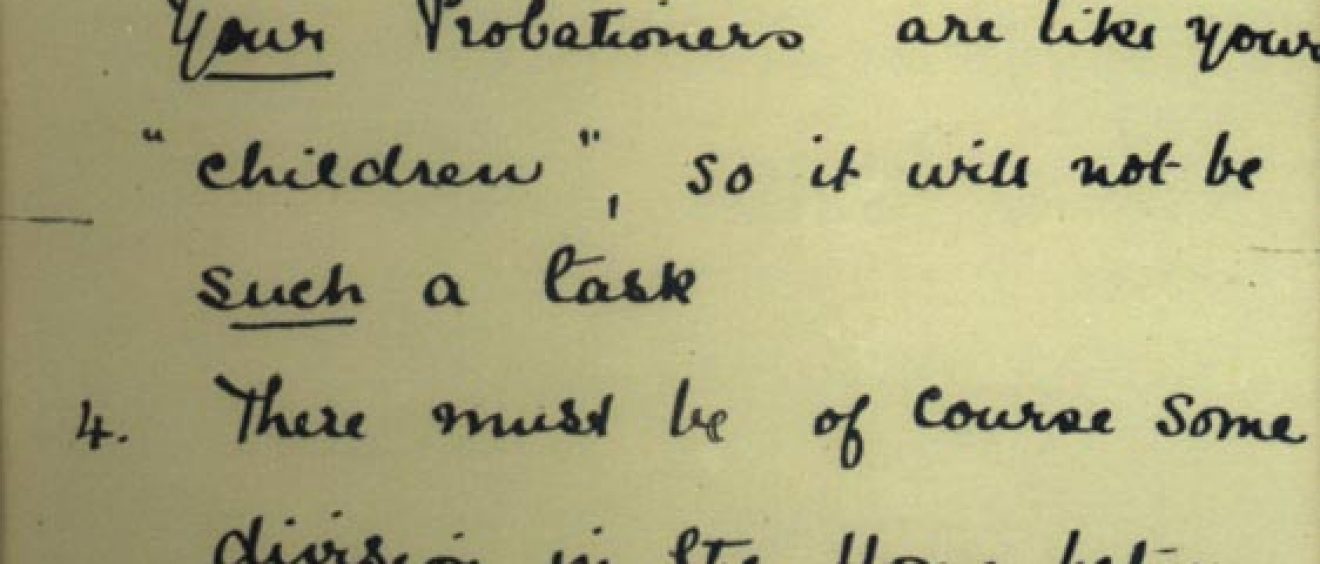
Florence Nightingale letters
We have letters of advice dating from 1896 written by Florence Nightingale to her cousin Edith Joanna Bonham Carter, who was at that time Lady Superintendent of Salisbury’s Nurses Home. Florence writes about her concerns for the expected number of new probation nurses and the amount of accommodation available to them.
Transcription of Florence’s letter of 15th November, 1896 to her cousin Edith:
Nov. 15 96
My dear and gallant Edith, I must say I think you are right. Five years’ night work takes so much out of a woman (most doctors say one is enough). But I am very sorry, for you. But only think how much you have done in those five years – being training mistress and night superintendent in one. However I do assure you you are now going to do more. For really Private Nurses are in such a state that it takes the gallantry of an Edith to tackle them. On the one hand there is as you say “Canting & sentimentality” and you only have them in the hospital by day, which is as if you were to turn the Probationers on like water from a cock, & turn them off again. The other extreme is still worse. Private Nurses make it a business & not a calling. They think only how much money they will make, how much holiday they can get and no one, or hardly anyone has taken them seriously in hand, to make a home for them to supervise their work, to keep up the tone.
The lodging system is, as you may suppose terrible – the attendance on officers is Barracks, when they are on their own footing has all the consequences you would expect in London. (partially obscured by ink spot) Nevertheless there are “10 just” women left!! I think your move settles the question of a Common Home to be built.
There are several considerations.
1. Have you calculated the number of Private Nurses on an average that you will have at home, i.e. not with a private patient or on holiday. You might have an average of 8 in the Homes – you can ascertain from the Books (partially obscured by ink spot) what the maximum will be. Will it exceed 12? It of course detracts very much from the idea of a Home in the nurses mind if she has to scrabble out of her room every time a nurse comes in unexpectedly from duty – Every nurse ought to have a room, or at least a cubicle to herself, for the sake of privacy. But that makes 64 rooms, (or partly cubicles) for the nurses instead of say 48. Might I ask you ideas on this head?
2. Then you have I believe 6 Probationers training in the Infirmary or had last year. Tho’ only 3 nurses left during 1895. In general Private Nurses leave oftener than Hospital nurses. You mean of course to train all Probationers night & day in the Infirmary for either Hospital or Private nurses. I wish I knew what you & Miss Johnstone propose for accommodation, & expect for No. of Probationers.
3. The work of a Supt. of Private (partially obscured by ink spot) is somewhat severe. e.g. one I know well wrote every fortnight to each Private Nurse on duty, and each was expected to write every fortnight to her – But when the number of her Private Nurses (she has a Hospital too) increased to 60, she found this impossible – They were still expected to write to her, but don’t. Your Probationers are like your “children”, so it will not be such a task.
4. There must be of course some division in the Home between Hospital & Private nurses, as there is between Day & Night Nurses so that the night nurses may sleep quietly by day.
5. I confess I have a strong feeling that Probs. during the 1st year should be under their own officer, so as to learn discipline, loyalty, good habits. They never learn them afterwards.
2) …… (we have 45 Probationers. We have just lost the irreplaceable “Home Sister” Miss Cropland) of 21 years.
6. They tell me that practically you will find the Common Home to be more economical. And with Hospital Matron (is Miss Johnstone called Matron?) & Home Supt. working together there can be no doubt, it will answer infinitely better for the moral benefit of the Nurses. Could your duties over the Home be coupled perhaps with some definite duties in the Hospital?
7. How many is the average number of occupied beds in the Infirmary – men, women, children, & in what sized wards? Small wards are not at all to be despised for training Private Nurses – They are more like what they will have to nurse in. I see a new vista opening under you for Private Nurses who are increasing in number every day, but not in efficiency or character. Please remember one thing Private Nurses don’t increase revenue of the Hospital.
8. I presume you mean to pay your Private Nurses wages then all they earn will have to be expended on them.
Good speed by yours – F. Nightingale

